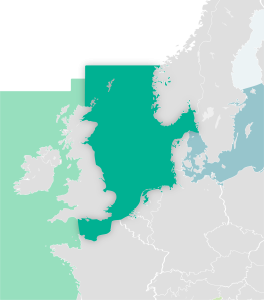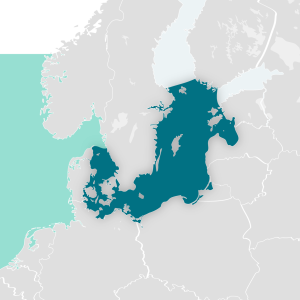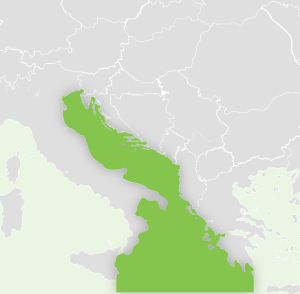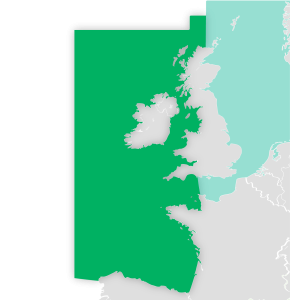SEAwise will focus on case studies in four regions, spanning small- and large-scale fisheries across pelagic, demersal, and deep water species, ensuring effective learnings and knowledge transfer between regions. In covering a wide geographic area, SEAwise will investigate all aspects of ecological and social impacts of fisheries, as well as spatial management and activities in changing environments. Findings will be brought together to enable a holistic understanding of, and response to, the key challenges to EBFM in Europe.

The North Sea is situated between the UK, Norway, and mainland Europe, and is host to a wide variety of habitats and commercially-significant fish species. Fisheries in the North Sea are faced with rapidly rising ocean temperatures, increasing demand for offshore wind developments, and changes to fishing-access due to Brexit. The dynamic policy landscape and environmental challenges currently facing the region mean that management advice must be both resilient and responsive to swift change.
The North Sea case study will model the cumulative effects of climate change, offshore wind developments, and changes in access to fish stocks and the fisheries that rely on them. By collaborating with stakeholders, we will examine the social importance of the region’s fisheries, exploring how management advice can balance the interests of various large- and small-scale operations, as well as drawing upon local stakeholders’ experience and knowledge. This will be achieved through a series of scoping workshops across the North Sea region, and through ongoing communications with the SEAwise Stakeholder Network.
Machine-learning algorithms will be utilised across a range of existing databases, alongside more traditional modelling methods, to predict future changes in fisheries’ carbon footprint, bycatch of sensitive species, fishing-related litter, and seafloor impacts. By drawing together these predictions, SEAwise offers holistic Ecosystem-Based Fisheries Management advice, which considers both the rapid changes that are currently happening in the North Sea, and the potential future impacts of different management strategies on fisheries, society, and the region’s ecosystems.

The Baltic Sea is a near-enclosed area of the North Atlantic, nestled between Scandinavia and mainland Europe, and connected to the North Sea via the Skagerrak and Kattegat straits. The region is characterised by areas of low oxygen concentration, historically high contaminant and nutrient levels, and significant interaction between fisheries and marine mammals. Management structures in the Baltic Sea must be adapted to mitigate these challenges in the context of wider ecosystem interactions, while accounting for the additional complexity presented by invasive species and the unprecedented rate of warming in the area.
In this case study, SEAwise will examine how commercially-important fish stocks (including cod, herring, and sprat) are impacted by changes in environmental and ecological conditions. New research will draw upon existing modelling approaches to evaluate how such changes could alter the wider environmental impacts derived from fisheries. Work will centre around predicting changes in fisheries’ carbon emissions, fishing-related litter, seafloor impacts, and the accidental capture of marine wildlife. The potential effects of different management strategies on the above impacts will also be tested, including under varying climate scenarios. This will ensure that research outputs, and eventual management advice, are resilient to climate change.
The Ecosystem-Based Fisheries Management advice that results from this case study will be based on the wants and needs of local stakeholders, as well as its predicted ability to meet fisheries and ecological objectives. As such, SEAwise will seek out stakeholder voices via a series of scoping workshops and the SEAwise Stakeholder Network. This will account for the inherent social value of small- and large-scale fisheries in the Baltic Sea, and will also provide an opportunity to incorporate the Traditional Ecological Knowledge of those who call the region home.

The Mediterranean Sea is an intercontinental sea that stretches along the southern coast of the European continent, and encompasses the Ionian and Southern Adriatic Seas – areas of particular focus to this case study.
This region of the Mediterranean is characterised by it s high biodiversity and socially important small-scale fisheries. Poorly identified and heavily-fished stocks make the Mediterranean ecosystem sensitive to changing environmental conditions. The area is also known for its low biological productivity, meaning that species have slow rates of growth and reproduction. This further complicates management by hindering the potential recovery of the ecosystem as a whole, and its associated fish stocks.
This case study will work to improve understanding of how fishing affects Mediterranean Sea ecosystems – assessing seafloor impacts, fisheries-related litter, and the accidental capture of sensitive species. Utilising machine learning, new research will predict how climate change, invasive species, and management measures will interact to affect the region’s environment and fisheries, anticipating changes in carbon emissions, catches, and profitability.
Collaboration with stakeholders will be integral to evaluating the potential social impacts of management advice on different groups in the region. A key goal of the study will be to assess the feasibility of giving Mediterranean fishers greater autonomy in decision-making, while balancing the diverse needs of small- and large-scale fleets. Stakeholder engagement will be achieved through a number of scoping workshops and feedback from end-users – offering local actors the opportunity to voice their needs and contribute their knowledge. Ultimately, SEAwise aims to advance understanding of the interactions between fisheries, the environment, and coastal communities in this unique region, in order to develop advice for EBFM that remains resilient to future change.

The Western waters are a subdivision of the Northeast Atlantic that extend from the west coast of Ireland and Scotland to the Strait of Gibraltar. Ranging from the semi-enclosed Irish Sea to the exposed continental shelves of the Celtic Sea and Bay of Biscay, the region is characterised by its diverse marine environments that play host to a broad range of fish stocks and fisheries. This diversity renders effective management challenging – a situation which is further complicated by potential changes to fishing rights following Brexit, changing environmental conditions, and reduced fish growth and reproduction in the area.
In this case study, SEAwise will develop innovative modelling approaches, combining them with existing models to deliver an improved understanding of the implications of environmental change on fished species. We will assess how different management measures designed to deal with such changes could impact fisheries and the wider marine ecosystem – predicting their influence on catches, carbon emissions, seafloor impacts, fishing-related litter, and bycatch rates.
We will also examine the potential effects of management strategies on stakeholders. To achieve this, we will seek the input of coastal communities and recreational users, alongside large- and small-scale fisheries, via a series of scoping workshops and forums for feedback. By integrating social, ecological, and economic considerations into our predictions, we aim to offer well-informed recommendations for the implementation of Ecosystem-Based Fisheries Management in the Western waters.
Building a dynamic, collaborative network is key to the success of SEAwise. We are actively seeking participation from stakeholders across the regions to inform our work, ensure that the priorities in focus are truly relevant to end-users, and help us realise the project’s full potential for enhancing benefits to fisheries while minimising adverse ecosystem effects.
Want to have your say about Ecosystem Based Fisheries Management in your area? Or just keen to learn more? Click here to find out more about the SEAwise Network, and how you can get involved.
Stay up to date with SEAwise news and research, hear about upcoming events, and receive updates on fisheries news from across the European seascape.